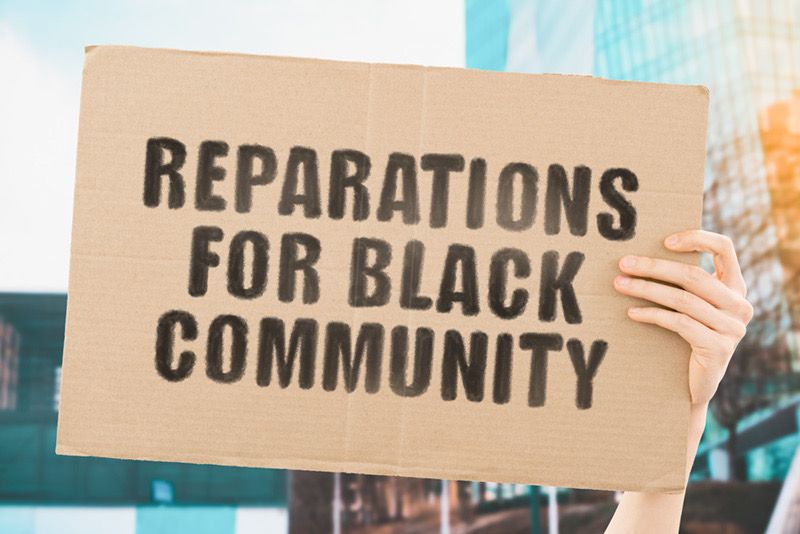California Reparations Task Force’s Push for Equity for African Americans – What’s Ahead?
California’s Reparations Task Force, the first statewide body to study and develop reparations proposals for African Americans, will issue its final recommendations by July 1. The Task Force could be historic, according to a special series produced by PBS station KQED, creating a reparations model the federal government could adapt for a nationwide package.
At a joint briefing, Feb. 28, by Ethnic Media Services, California Black Media, and Charles Communications Group, speakers – Secretary of State Shirley Weber; Assemblymember Jones Sawyer, D-57th Assembly District and Reparations Task Force Member; Attorney Don Tamaki, Reparations Task Force Member; and Moderator: Regina Brown Wilson, CBM – addressed why the Task Force was formed in a state that claimed to be a free state, who is eligible to receive reparations, how the program could affect the state’s economy.

Secretary Shirley Weber began with discussing why reparations are critical for the quest for racial equity for African Americans.
Talking about AB 3121, why she felt it was important to author the bill and to put it on California’s agenda, Secretary Weber said, “The Congress has been grappling with the issue of reparations for 40 years now. In terms of proposing recommendations as to what needs to happen to try to bring some sense of equity with regards to African Americans in the United States, and the discussions of the harm that’s been done.”
“In each case it gets, it doesn’t seem to get off the floor, it doesn’t get to get any win behind it.
“California could be an example of what can possibly happen when the conversation occurs. We were a state that was extremely diverse and we had done many things as a state to deal with the issues of equity, and the one population that has obviously suffered the most has been the African-American population.
“As a result of prop 209, and the various kinds of things, without any recognition whatsoever of the harm that possibly has been done to African Americans and how we need to aggressively and affirmatively address the issue to try to bring some sense of justice and equality to African Americans, so AB 3121 was born in that kind of atmosphere, and as a result it was proposed and passed by some folks in one session.
“AB 3121 one came into existence not to prove that there was harm done but to examine the amount of harm that had been done, and to find remedy for it, because no one not denies the fact that slavery was very harmful, not only slavery but post-slavery activities that took place, whether it was economic, whether it’s redlining, whether it was a vicious attacks on people’s lives, whether it was the stealing of people’s property, poor schools, poor resources put into communities that had a tendency to make any progress made somehow another minimized, so as a result, California is the first state in the nation to basically talk about reparations,” said Secretary Weber.
Assemblymember Reggie Jones Sawyer of the 57th Assembly District
“Many of us have been working on this for well over two years. Some of us even voted on Dr Weber’s bill when it was in the assembly, and I’m proud to say that I voted for it, to make sure it got out of the assembly for and onto the governor’s desk,” said Assemblymember Reggie Jones Sawyer of the 57th Assembly District.
“I firmly believe the report that we put out last June, others will pick up that document and use it as they start to discuss ‘How we do reparations?,’ in other cities, counties, states, and ultimately we should have a national reparations,” said Assemblymember Jones Sawyer.
Attorney Don Tamaki, Reparations Task Force Member
Tagging along with Reggie Jones Sawyer’s statement about change, Tamaki said, “10-20 years ago something like this would not have happened and certainly the number words of journalists of color and diversity and that’s a tribute.”
“My connection to the reparations movement arises from our own community. I was on the legal team to reopen core Matsu versus the United States, which was a World War II decision, which upheld the incarceration of an entire racial population into concentration camps, which was reopened to establish that there was no reason to do this and ultimately it led to or at least contributed to the concept of reparations, which is one of the very few examples in modern history where the government has acknowledged a great wrong and put some meaningful financial atonement behind it,” said Tamaki.
“There is no equivalence between four years in a concentration camp, in 400 years of exclusionary policies, and enslavement, and everything else, but there are some lessons to be learned, and the cornerstone of our movement that helped make it successful was the publication of a study in the report,” said Tamaki.


